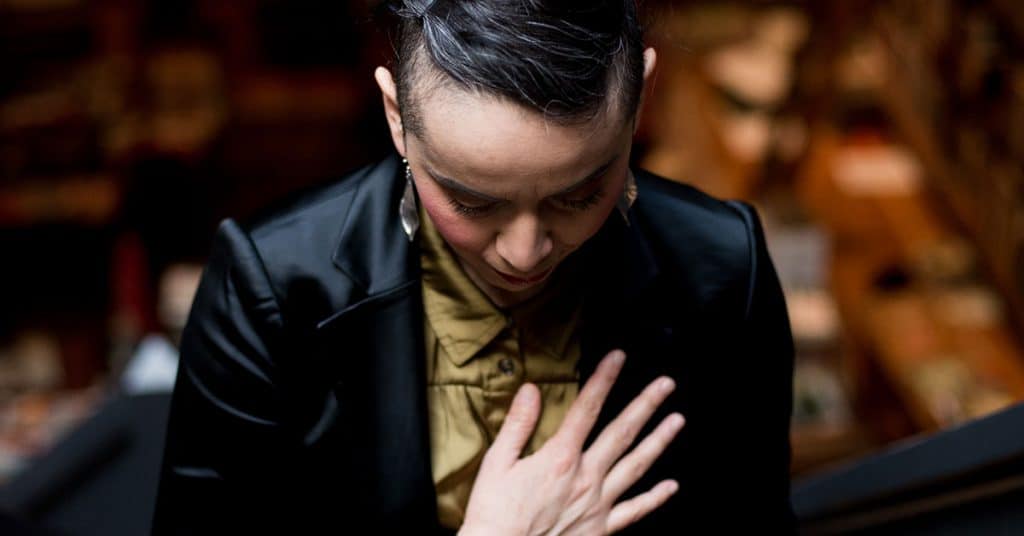Edna Vázquez News
Edna Vázquez blends Mexican and American folk, pop and rock into something fabulous for Carnegie Hall Citywide; at the LGBT Community Center in Manhattan’s West Village; on Monday, February 13, 2023 at 7:30pm. FREE! 🏳️🌈🇲🇽
Edna Vázquez is the Chavela Vargas of Mexican American Folk Rock
Edna Vázquez is as Portland Mexican singer-songwriter originally from Colima, Jalisco, México, in the heart of mariachi country. But she is not our father’s mariachi. Edna has forged her own direction, with one foot on both sides of that line in the sand.
The more we listen to Vázquez, the more we like her. We wouldn’t call her a mariachi, even though you hear hints of Jalisco in her music. We call her a truth singer. She is true to herself, her music, and her audience. That’s an artist. ¡Bravo!
Our original coverage was sponsored by Carnegie Hall. Gracias.
ednavazquez.com
Twitter @ednavazquez
Instagram @ednavazquezmusic
Key Albums
Besame Mucho with Pink Martini (2019)
Sola Soy (2015) was Edna’s first professionally produced record.
Ser Abstracto (2014) was her first full-length album.
Canciones a Mi Tierra (2013) featured originals in a traditional style.
No Passengers (2013) was her rock record.
La Nina Tonatl (2009) was Edna’s trova debut. The title refers to her birthplace.
New York Venues
- Brooklyn Museum
- LGBT Community Center gaycenter.org
Edna Vázquez is a Mexican mariachi singer-songwriter and LGBT advocate originally from Jalisco, Mexico, the mariachi heartland.
She is known as a mariachi singer and you can hear those strains in her music, but Vázquez gathers many different influences into a bluesy personal style that might be called post-mariachi. She is what happens when you leave mariachi-land and that’s what she has done in her life.
The work is sort of a personal trova as in Cuban trova, the Latin American protest music for which folk singers Bob Dylan and Joan Baez in the 1960s were the U.S. equivalent.
With a background in traditional Mexican music, Vázquez is anything but traditional. A fierce character and a big voice have given her a kind of independence.
Vázquez started out in mariachi, but mariachi used to be only done by men (see also Flor de Toloache). She is openly lesbian and while that is not a big deal in many places today, twenty years ago in Mexico, it was a very big deal. Mexican women didn’t do men’s work and didn’t love women openly. Going against the current made you very alone. Perhaps that’s what she is singing about in Sola Soy (I am alone) with Pink Martini.
Her Mexican traditions, big voice and fierce presence recall Chavela Vargas, another woman rooted in Mexican tradition, who sang in a man’s world, and was openly lesbian when that was not cool. There is something attractive about both artists’ ability to break tradition while being traditional.
When Vázquez sits down to perform, you just know that she is going to sing honestly to you. She won’t give you anybody but herself, but in her music, she gives all of herself. Just like Chavela used to do, Vázquez completely enters the song and takes you along with her. In our manufactured glossy pop world, she brings a breath of fresh air.
Edna Vazquez
Edna Fabiola Vázquez was born in Colima, México and raised in Tonila, Jalisco. The big city in Jalisco state is Guadalajara, the capital of mariachi.
She started writing music as a teenager. Vázquez came out as lesbian when she was seventeen. For that her parents sent her to the U.S. where she joined Mariachi Los Palmeros in Salem, Oregon in 1998. That’s what used to happen in those days. When you came out, you got kicked out of your parent’s house.
In 2010, Vázquez performed on the Spanish-language talent show Tengo Talento, Mucho Talento (I’ve got talent, a lot of talent). She sang a traditional Mexican song from her mother’s home region that left the judges in tears.
This opened doors to more television appearances and a solo career.
In 2017, Vázquez spoke to Amanda Cargill for Latina magazine about the role her sexuality plays in her music. It’s worth repeating because Vázquez nailed it, and what she said resonates beyond the LGBT world.
She said, “I look forward to a day when we can drop the labels and everyone can be who they are, regardless of gender identity, sexual orientation, skin color or cultural heritage.”
Edna Vázquez has a dream, and in the manner of a true artist, she invites you to dream with her. We have the same dream.

